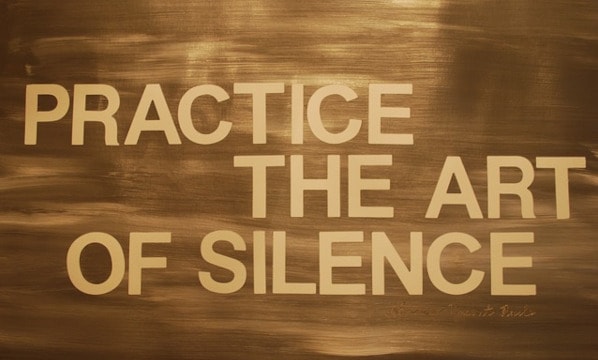For most people, silence is an uncomfortable state to be in, whether in solitude or part of a communication process. Yet, throughout history, silence has been an essential habit in the lives of leading figures in politics and philosophy and contributed a great deal to their success.
Beyond that, in a noisy world where our attention is sought after, whether in the physical world or through our digital appliances, it is easy to lose the sense of oneself and thus be overwhelmed in any circumstance where the noise is absent. Yet, this noise causes immense pressure on us and our mental and physical capacities.
Silence as a powerful tool in communication, self, and spiritual development has been recognized for ages. The stoicism philosophy and the meditation practices in different disciplines are proof of this.
The adage that silence is golden is a reminder that silence can be precious when pursued intentionally. It is one of the most effective ways to practice mindfulness and find the meaning of your life, words, and actions. In this regard, silence becomes essential to our spiritual pursuit.
The Power of Silence – Psychology
Psychology is one of the main fields where silence plays an important role. It is essential in the communication process in the expression of states and concepts. More importantly, silence is vital in the demonstration of empathy and understanding from psychologists to their patients.
Even in the normal day to day interactions, the silence holds plenty of power. Here are five reasons why silence psychology holds much power;
Silence attracts attention
During conversations, it is easy for one of the parties to lose concentration. Even in crowds and in digital communications, it is challenging to maintain attention with everyone talking and competing with other distractions.
However, when one is silent and maintains it, it sends an alert signal to the other parties and attracts attention. It is a powerful way to get attention back.

Silence can be an answer.
Another role of silence is to be an answer on its own. If you struggle with overexplaining, silence can be a better way to convey your response, especially when seeking to soften the blow of negative communication. It negates the use of harsh words or where many words could do more harm.
Silence makes use of non-verbal language.
An exciting part of silence psychology is the weight it shifted on non-verbal cues. Non-verbal cues are powerful and often convey more than what words can pass on. As such, silence allows one to be proficient at using and decoding them since you pay more attention to other aspects than just what you want to say.
Silence provides empathy for others.
There are many instances where words are not enough to communicate empathy and understanding. In most cases, whether it is to yourself or others, silence is the only way that provides understanding.
Being able to step back and reflect on events in your life allows you to understand yourself and be less desperate and judgmental.
The same happens with other people and just being there without necessarily saying words offers more profound comfort and allows them to open to you instead.
Silence is polite
The silence, when used properly, is a powerful psychological means of politeness. With human beings barraged from all angles for their attention, with news, work, and home-related stress, silence is a remedy.
Most people seek to be listened to but do not have that luxury as everyone wants to get a word in. By practicing silence, you offer other people a chance to speak, and it is a strong demonstration that they matter.
You can also practice this for yourself, allow your body and mind to switch off from all the noise, and remind yourself that you matter.
Related reading: How to Get Rid of Negative Influences in Your Life? – Opens in new tab.
Positive and Negative Effects of Silence
Like any tool, silence can be used in positive ways and offer positive results, or it can be used negatively and have adverse effects.
The positive effects of silence have a beneficial impact on our health and general wellbeing. The benefits of silence include;
1. Silence can help you lower your blood pressure, which in turn reduces the risk of cardiovascular conditions.
2. Prevents plaque from forming in arteries
3. According to studies, silence helps relieve stress by lowering stress hormones’ cortisol and adrenaline in the blood. The study found that silence, even for two minutes, relieves the body tension and is more effective than listening to music.
4. It helps boost the body’s immune system, thus play a role in fighting diseases.
5. It boosts your mental health and can promote the growth of new cells. A study found that two hours of silence can help create new cells in the hippocampus region, which is linked to most cognitive and emotional functions.
6. It helps boost the regulation of hormones and optimum function of body systems that relate to hormones.
7. Another study in 2015 found that sleep is an excellent form of relief for adults who have insomnia. Mindful meditation helped improve sleep quality and reduced daytime impairment.
On the other hand, silence can have adverse effects. These effects usually happen when the silence is imposed or a defense mechanism due to a lack of other options. Adverse effects of silence include;
- It prevents one from speaking and providing credibility to one’s voice.
- Affects one’s right to participate in society
- It is a barrier to communication.
- When used as a tool for shaming and restriction
- It becomes intimidating or coercive.
Spiritual benefits of silence
Silence has a spiritual nature to it, mostly when seen as an aid to meditation and pursued as a tool to communicate with oneself. Some spiritual benefits include;
Reflection
Silence allows you to have a deeper introspection than just shallow introspection. You get to see your life clearer and make connections in a seemingly disconnected world.
It is such a reflection that helps you start on self-improvement programs, take on challenging career paths, and even pick better lifestyles.
Self-awareness and environment
Silence allows you to become self-aware. You can pick physiological changes faster and better know what is right or harmful to you. You also become more appreciative and aware of the environment around you.
Sensitive to the flow of life
According to the Law of Vibration, we are all connected in the universe, and often, amid all the noise, it is easy to lose the connection with the flow of life. Silence allows you to be aware of your essence, which allows you to maximize your potential.
Inspiration
Finally, silent meditation is an excellent source of inspiration and creativity. Being still and letting thoughts pass through your mind, and not worrying about current stresses allows you to tap on your creative potential and find solutions. Silence allows us to address long-standing issues.
Related article: “Meditation, where to start” – Opens in new tab.
How to Practice Silence
Practicing silence is not as difficult as it may appear. Any challenges you experience will mostly be because of the novelty of the experience. With a little practice, it will become second nature to you. Some of the guidelines to follow to achieve are

- Be intentional: You should choose to be silent and not happen to be silent. It must be a conscious effort on your part. Even when you practice, this should not be a time that usually finds you quiet, but rather a time, you will decide to stay silent regardless of the circumstances.
- Have a strategy: Decide early enough on the place and duration of your silence and anything you would be doing to aid with your mindfulness.
- Define rules: Set the boundaries of how you will protect yourself from the noise during this period and a clear setup of what this time will look like.
- Have fun: This period should be used for meditation, long walks in nature, or journaling. It is not just aimless silence but a time that allows for in-depth reflection.
Like any new habit or routine, you may struggle with where to start. These tips should get you going.
- Learn to stop talking. You need to start small, and this will be in your conversations and general daily interactions. The first thing is to learn to resist the urge to keep talking or filling silent moments with words. Instead, learn to cherish these moments and reduce idle chatter even in texts or social media.
- Carefully pick your words: take time to pick your words when you must speak or even text something so that when you do, it is either wise, loving, inspiring, or funny, not just speaking for the sake of filling the silence or reacting.
- Practice mindfulness; it is very hard to be engaged in the usual noise when being aware of your environment.
- Learn to disconnect from the screens: TV shows or your iPhone and other gadgets can distract and add to the noise and depression.
- Practice prayer and meditation: The easiest way to maintain a silence schedule is by having prayer or meditation times. It is uplifting and develops your spiritual life while at the same time offering moments of reflection.
Bottom Line
Silence is a powerful psychological resource. It should not be a source of discomfort but rather a cherished time for yourself. It has significant health and spiritual benefits and improves your daily interactions.
In every noisy world, it can be the perfect getaway you need to recharge and refocus.
Check out our collection of “Free Online Audiobooks” and many free resources in our “Free Library”
Stay in Touch
 Join our newsletter by using the forms on this website or click here!
Join our newsletter by using the forms on this website or click here! Follow us on Google News
Follow us on Google News Follow us on Facebook
Follow us on Facebook
Featured image from Depositphotos






